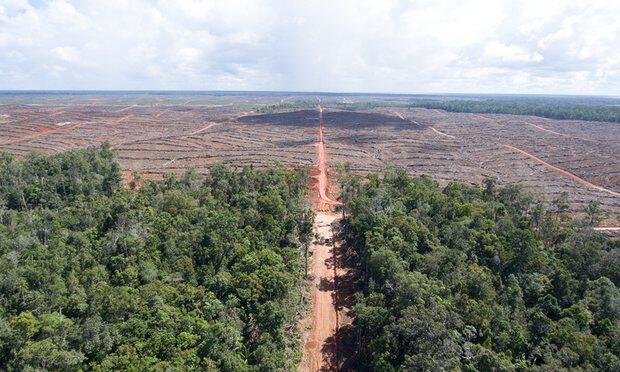A Korean palm oil company has been dropped by buyers after footage emerged that allegedly shows the illegal burning of vast tracts of tropical forest on lands it holds concessions for in Indonesia.
Some of the world’s biggest palm oil trading producers including Wilmar, Musim Mas and IOI have stopped using palm oil sourced from Korindo, much of which is destined to meet European demand.
Korindo’s alleged deforestation of pristine woodland in Papua province also threatens to destroy the last sanctuary of several birds of paradise and the tree kangaroo, according to a report by a new environmental alliance called Mighty.
The group has collected evidence from drones, remote sensors, GPS satellites, and videographers and photographers on the ground, which it says proves that Korindo has flouted Indonesia’s no-burning laws and violated responsible sourcing requirements.
Bustar Maitar, Mighty’s campaign director in Papua, told the Guardian: “Korindo is clear-cutting forests and then starting fires to clear the land of remaining biomass. That is forbidden by Indonesia’s regulations but during last year’s forest fires, most of the blazes in the Papua region happened in Korindo’s concessions.”
“There are a lot of animal species and flora here that haven’t even been discovered yet,” Maitar added. “If these kinds of land clearing activities continue, they may never be.”
But Koh Gyeong Min, Korindo’s head of sustainability, denied that the firm had been responsible for any illegal forest burning. “It is not true actually,” he said. “We followed all of the Indonesian regulations and acquired all the proper licences from the government for all areas of operation within our group.”
“I also would like to ask: do the local NGOs or residents have any evidence about our company that they have brought to the Indonesian government or the local courts? As far as I know there have been no cases of that.”
The allegations come as south-east Asia’s 2016 burning season is just beginning. On 30 August, the Indonesian government warned that haze from fires on Sumatra and Kalimantan could reach Malaysia and Singapore in the days ahead.
More than 3,000 hotspots have been detected in the Indonesian archipelago in the last month, with maps released by Greenpeace of Riau and West Kalimantanshowing that many are occurring on industrial plantation concessions in the same areas that burned last year.
Yuyun Indradi, Greenpeace Indonesia’s forest campaigner said: “Companies that refuse to take steps to prevent fires have not just ash, but blood on their hands.”
Wildfires in Indonesia’s tropical forests last year are thought likely to have contributed to the premature deaths of more than 100,000 people, and to have emitted more CO2 than the whole of the UK that year.
Korindo is active in Indonesia’s north Malaku region as well as Papua, holding around 620 square miles of forest concessions in total. The company, whosepromotional video calls on viewers to “make the Earth green”, has already cleared around 193 square miles of forest.











